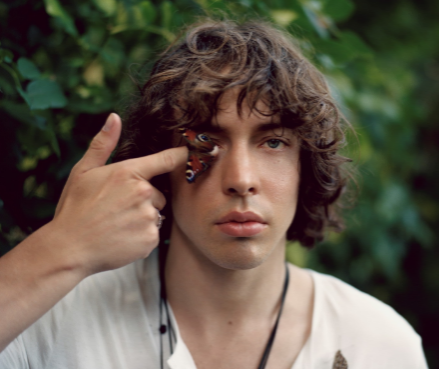
Bella Howard

Audio By Carbonatix
Barns Courtney possesses all the qualities needed to be this generation’s monster-sized rock star. A natural performer unburdened with the obnoxious neediness to be liked, the U.K.-based recording artist is cool and self-deprecating in the same breath. It’s a sight to behold, and Dallasites can see it firsthand when he returns to play House of Blues on May 7.
Most recently known for last year’s breakout single “99,” the release proves a departure, albeit a fun one, from the moody, blues-infused tracks that made up Courtney’s 2017 album The Attractions of Youth. While the playful tones of “99” have the infectious qualities necessary to become a repeat feature on any music player, Courtney initially had reservations about presenting the new sound and thus alienating fans accustomed to his earlier work.
“I was full of trepidation as to whether my fans were going to accept that song,” Courtney says. “Due to the fact that it’s completely, to my mind, different from the first record. The first album there’s no synth, it’s a very determined, defiant kind of record. And ’99,’ on the surface, is far more easygoing.”
The change of sound came from Courtney not wanting to repeat the same beats found on the first album, nor if it failed to come from natural inspiration. He recalls sitting in the studio with his writing partner, Sam Bartle, and realizing they needed to write without a road map, letting the music take on whatever genre it happened to be when they finished.
When news happens, Dallas Observer is there —
Your support strengthens our coverage.
We’re aiming to raise $30,000 by December 31, so we can continue covering what matters most to you. If the Dallas Observer matters to you, please take action and contribute today, so when news happens, our reporters can be there.
Courtney’s journey to this point – where he’s able to ask and receive the trust from his fans as he works outside of a previously established comfort zone – has been a long and unsteady one. It’s only been a few years since Courtney’s partnership with Island Records resulted in the production of an album that was recorded but never released, followed by the recording company dropping him while he toured in the U.K.
“The grieving period in which I spent realizing that my career degenerated into a complete farce and a failure crept up on me,” Courtney says. “I mean it hit me like a ton of bricks eventually, but it was really strange. I definitely went through all the phases of grieving a lost career. Like the denial, and the anger, the depressi
“I definitely went through all the phases of grieving a lost career.” — Barns Courtney
on, the bargaining, it was all there.”
A handful of years later, after struggling to accomplish something as simple as finding a place to sleep each night, Courtney rebounded with his singles “Glitters & Gold” and “Fire.” The songs provided him the much-needed exposure in both radio play and in being featured on movies and television shows such as the hit series Top Gear.
As Courtney begins to appear in the line of vision of American audiences, he has thrown himself into a schedule of constant touring, being the support act for large names like The Kooks, The Wombats and in the case of the upcoming House of Blues show, Elle King.
“Every night is a new challenge,” Courtney says. “Every night is a new conversation, or striving to build a connection with a new audience, and they all need different things.”
After so many years of a career that’s been host to severe swings of positive and negative experiences, Courtney continues to be grateful for the fans who come just for him, regardless of whether his name is the lesser known on the marquee. At the rate he’s been performing, it won’t be long until he’s burned his name into the memory of anyone and everyone who bought a ticket to see someone different.
“It’s a puzzle I really enjoy,” Barnes says. “It’s like going out for a boxing match every night. I love it when I come out, and the crowd doesn’t give a fuck, and then I see that moment – you can see it, it’s very clear from the stage – you can see the moment when you flip them from the expression on their faces.”